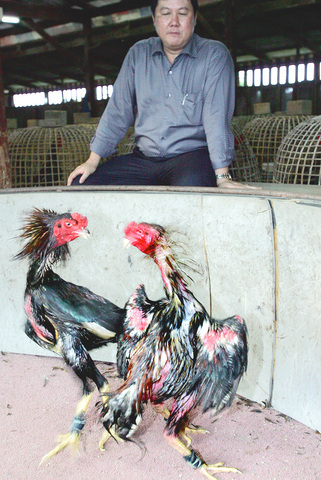Weighing in at 3.5kg, eight-month-old Ai Lueng steps into the ring, ready to fight not only his feathered opponent but also to preserve Thailand's ancient -- and profitable -- tradition of cockfighting.
Ai Lueng, whose name means "Yellow," is sparring against another mid-size bird in training for his first fight, as the government prepares to lift a ban on cockfights that was imposed to halt the spread of bird flu.
"The cocks are normally very well cared for by the owners, because the birds are very expensive and those going to the dens to fight must be very strong and healthy so that they can win," Paitoon Isarasereepong says.

PHOTO: AFP
Paitoon, a member of the Bangkok Metropolitan Administration, has for four decades raised cocks as a hobby at his farm on the outskirts of the city.
But his hobby is actually a big business in Thailand, where cockfighting has grass-roots appeal as a sport dating back centuries.
A fighting cock can cost anywhere from a few thousand to a few hundred thousand baht, while bets at licensed cockpits start at 5,000 baht (US$125), Paitoon says.
Total bets for a single fight can reach up to 1 million baht (US$24,100), according to those connected with the tradition.
Until bird flu was confirmed in Thailand in January last year, live Thai cocks were a prized export used to improve breeding stock in other countries.
Paitoon once raised cocks for export, selling each bird for about 5,000 baht (US$125). But that business collapsed under international bans against live birds and raw poultry from Thailand.
Domestically, Thailand imposed tough restrictions on the transport of fighting cocks, which travel around the country for their matches.
The birds were given their own "passports," complete with a photo, certifying they were healthy.
But after the latest resurgence of bird flu in October killed three people, authorities banned cock fighting altogether, drawing surprisingly strong protests as a business was wiped out for cock owners.
A fighting cock magazine estimates there are 15 million fighting cocks in Thailand, but the exact number of birds culled as a result of bird flu containment measures in recent years is not known.
More than 120,000 people protested in Suphan Buri, just west of Bangkok, late last month to call for a resumption of cockfights and to allow the use of a vaccine for the birds.
Faced with a revolt, especially in rural areas where Prime Minister Thaksin Shinawatra enjoys most of his support, the government agreed to allow cockpits to reopen from Jan. 1 if they meet health standards.
Sermchai Sawasakorn says his farm in northeastern Thailand is losing at least 6,000 baht (US$150) a day because of the ban.
About one-fifth of his more than 2,000 cocks were culled as part of the government's battle against the disease.
"I thought I might just get out of the business," he says.
Sermchai said the government should reserve its toughest measures only for areas where bird flu has been detected.
Cock raisers still hope that the government will allow them to vaccinate their birds.
The government has so far refused to allow the vaccine for fear it could lead to a mutation of the virus. Scientists fear the H5N1 virus could mutate to a form that passes easily among humans and could kill millions around the world.
Thai researchers are testing a vaccine for government safety checks.
Paitoon says the vaccine would prevent his birds from getting the virus.
"The vaccine is used in other countries such as Vietnam and China. It didn't stop the outbreaks there so far, but that's because they don't have enough of it," he says.

MONEY GRAB: People were rushing to collect bills scattered on the ground after the plane transporting money crashed, which an official said hindered rescue efforts A cargo plane carrying money on Friday crashed near Bolivia’s capital, damaging about a dozen vehicles on highway, scattering bills on the ground and leaving at least 15 people dead and others injured, an official said. Bolivian Minister of Defense Marcelo Salinas said the Hercules C-130 plane was transporting newly printed Bolivian currency when it “landed and veered off the runway” at an airport in El Alto, a city adjacent to La Paz, before ending up in a nearby field. Firefighters managed to put out the flames that engulfed the aircraft. Fire chief Pavel Tovar said at least 15 people died, but

LIKE FATHER, LIKE DAUGHTER: By showing Ju-ae’s ability to handle a weapon, the photos ‘suggest she is indeed receiving training as a successor,’ an academic said North Korea on Saturday released a rare image of leader Kim Jong-un’s teenage daughter firing a rifle at a shooting range, adding to speculation that she is being groomed as his successor. Kim’s daughter, Ju-ae, has long been seen as the next in line to rule the secretive, nuclear-armed state, and took part in a string of recent high-profile outings, including last week’s military parade marking the closing stages of North Korea’s key party congress. Pyongyang’s official Korean Central News Agency (KCNA) released a photo of Ju-ae shooting a rifle at an outdoor shooting range, peering through a rifle scope

South Korea would soon no longer be one of the few countries where Google Maps does not work properly, after its security-conscious government reversed a two-decade stance to approve the export of high-precision map data to overseas servers. The approval was made “on the condition that strict security requirements are met,” the South Korean Ministry of Land, Infrastructure and Transport said. Those conditions include blurring military and other sensitive security-related facilities, as well as restricting longitude and latitude coordinates for South Korean territory on products such as Google Maps and Google Earth, it said. The decision is expected to hurt Naver and Kakao

Gaza is rapidly running out of its limited fuel supply and stocks of food staples might become tight, officials said, after Israel blocked the entry of fuel and goods into the war-shattered territory, citing fighting with Iran. The Israeli military closed all Gaza border crossings on Saturday after announcing airstrikes on Iran carried out jointly with the US. Israeli authorities late on Monday night said that they would reopen the Kerem Shalom crossing from Israel to Gaza yesterday, for “gradual entry of humanitarian aid” into the strip, without saying how much. Israeli authorities previously said the crossings could not be operated safely during